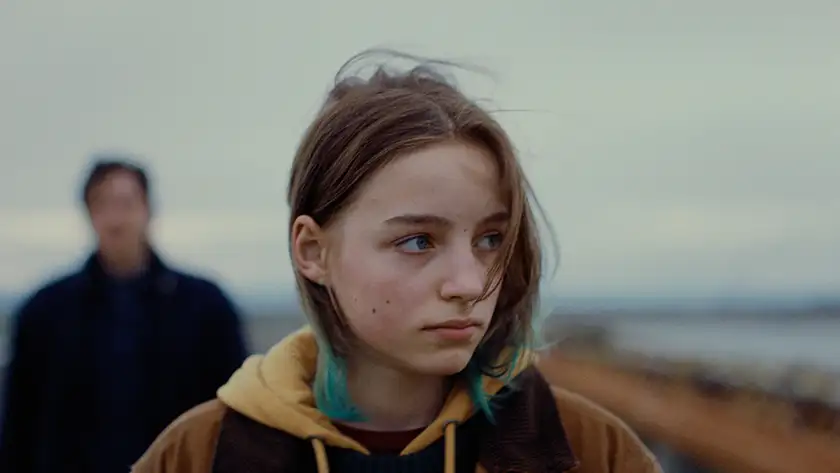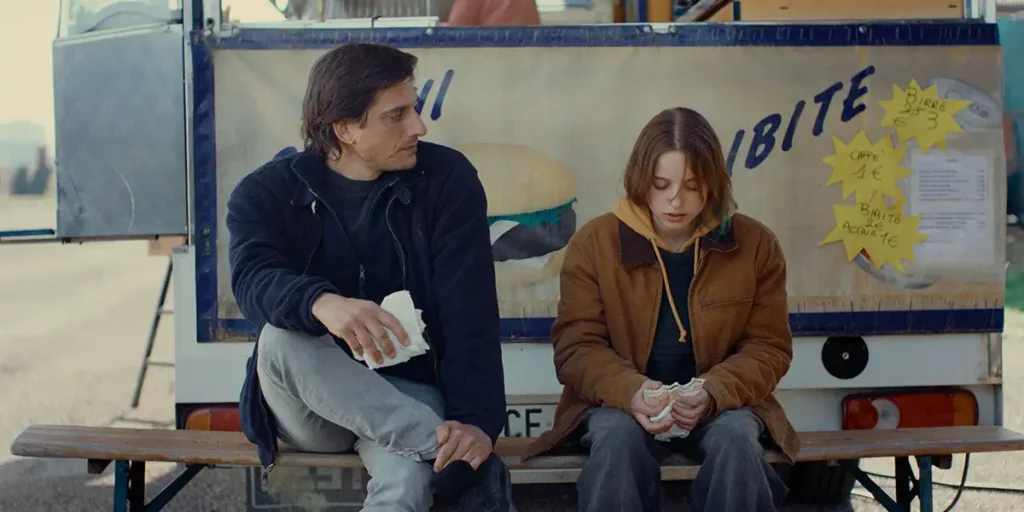Juli Grabenhenrich and Luca Marinelli shine in Paternal Leave, Alissa Jung’s strong debut film about a daughter and a father navigating their conflicting emotions.
Writer & Director: Alissa Jung
Genre: Drama
Run Time: 113′
Language: English, German and Italian
Berlin Film Festival Screening: February 15, 2025
U.S. Release Date: TBA
U.K. Release Date: TBA
Alissa Jung’s Paternal Leave begins with a message on an answering machine. “Leo, answer the phone,” says our protagonist’s mother several times, but her daughter is too upset to do just that. Soon, we watch her leave her home in Germany and board a train to Marina Romea, Italy. It doesn’t take her long to reach her destination: in no time, she’s standing in the house of a young man whose existence she’d ignored for the past fifteen years – but that doesn’t mean she didn’t feel his absence.
Leo (newcomer Juli Grabenhenrich) made the trip to meet her father, Paolo (Luca Marinelli, of Martin Eden), who was very young when her mother got pregnant and left her to raise their daughter on her own. Now 15 years old, Leo has only just discovered her father’s name; though she doesn’t really know what exactly she’s doing at a beach bar in Italy, she knew she had to find him. In fact, she left so quickly that nobody back home even knows she’s there.
As for Paolo, he has his own life, and he wasn’t exactly expecting her. With a very young child from another failed relationship (Joy Falletti Cardillo’s Emilia) staying at his place too, he’s completely overwhelmed; he wants to have this conversation, but he doesn’t know how to. From his behavior during these first meetings, we get the sense that he means well, but he’s crushed by the weight of expectations that, up till this moment, he had been able to avoid.
“You can’t stay here,” Paolo tells Leo, impulsively, but she’s not going anywhere. With no money and no idea of what exactly she even needs from him, she’s determined to get her father’s attention. And so, she stays in town, and even meets some of its residents, like friendly delivery guy Edoardo (Arturo Gabbriellini), with whom she instantly gets along. Soon, they start calling each other “Sherlock and Watson” and bond over the contradictions in their lives, and their conflicting feelings toward their respective fathers.

Eventually, Leo’s attempts to get Paolo to notice her pay off, and whenever he’s not looking after Emilia, the two if them start spending time together, each getting used to the other’s presence and even seeking and enjoying each other’s company, but both keeping so many feelings to themselves. It’s a delicate balance, and one that crumbles as soon as Paolo prioritizes his younger daughter over Leo, which causes these emotions come out like a flood, all at once. But just like that, when the storm is over, something unexpected takes place: they both grow up.
Paternal Leave is a poignant debut feature for writer-director Alissa Jung, who immerses us in Leo’s life from the moment she first appears on the screen with confident camerawork that always keeps our attention on her. The gorgeous, desaturated color palette, from cinematographer Carolina Steinbrecher (Eternal You), gives the film an intimate feel that imbues Marina Romea – a small, placid seaside town whose existence not many Italians are even aware of – with so much personality, making it come across as familiar and even poetic. The score also helps establish Leo and Paolo’s universe, with Lucio Dalla’s anthem “Anna e Marco” taking center stage in one of the most poignant scenes of the movie.
If the film works as well as it does, it’s in no small part thanks to Juli Grabenhenrich and Luca Marinelli, who are both superb here. Every single interaction between our leads feels authentic; each plays off the other to perfection and demands our attention in every single scene, often without even having to talk. Arturo Gabbriellini (We Are Who We Are) is also a standout as Edoardo, who’s not only a wonderfully three-dimensional character despite his short screen time but also the one who surprises us the most – first with a hilariously ironic yet surprisingly accurate line about Italy being “all about c*zzo and religion”, and then with an unexpected revelation about himself that gives his character so much more depth.
The character of Paolo, and Marinelli’s skills in bringing him to life, also gives us an interesting analysis of masculinity, in a way that feels particularly authentic to Italian relationships. As he tries to take responsibility of his past and have a conversation with his daughter, Paolo does anything from lying to avoid confrontation to keeping everything inside until all his emotions emerge like a flood, and even resorting to violence when fear takes over. In an especially moving scene, he’s only able to express himself when there’s a literal wall separating him from his daughter. As an Italian myself, I recognized so many of the patriarchal dynamics depicted in Paternal Leave, both in Paolo as a character and in the film’s approach to fatherhood and family.
Paternal Leave is very much a debut film. There are some parts, toward the end, where the movie loses some of the nuances it established in the first half, despite also containing some great scenes, including a particularly affecting one between Leo and Emilia. The final act feels a little unfocused and predictable, and some of the side characters could have done with more depth, such as a violent father who verges into stereotype. I was also a little disturbed by a scene involving a flamingo that felt too forced and sentimental to me compared to the subtler development of Paolo and Leo’s bond earlier in the movie, but this is a matter of personal taste.
Overall, Paternal Leave is still a strong debut that I’d definitely recommend, and that makes me excited for Jung’s future projects. A charming and intelligent first half, two fantastic lead performances, impressive world building and technical execution, and a story that will stay with you long after the credits roll make Paternal Leave a worthwhile watch at the 2025 Berlin Film Festival.
Paternal Leave: Movie Plot & Recap
Synopsis:
Fifteen-year-old Leo, who has grown up without her father, leaves her home country of Germany for a seaside town in Italy when she discovers his identity. Her father, Paolo, doesn’t initially seem to want her there, but soon a beautiful bond starts to develop. As Paolo’s younger daughter comes into the picture, things become more complicated and a confrontation is inevitable.
Pros:
- A strong directorial debut that will stay with you for a long time
- Fantastic performances from leads Luca Marinelli and Juli Grabenhenrich
- A great analysis of masculinity that feels specific to Italian relationships, and unexpected insight from Edoardo, played to perfection by Arturo Gabbriellini
- Cinematography and score make the film’s unusual setting come alive in unexpected ways
Cons:
- The two protagonists feel more one-dimensional in the second half of the movie, where their behavior and relationship evolves in a less nuanced way
- A disturbing scene involving a flamingo that feels forced and out of place
Paternal Leave premiered at the Berlin Film Festival on February 15, 2025 and will open in Italian cinemas on May 15, 2025. Read our interview with Luca Marinelli below and check out our other Berlin Film Festival reviews!

